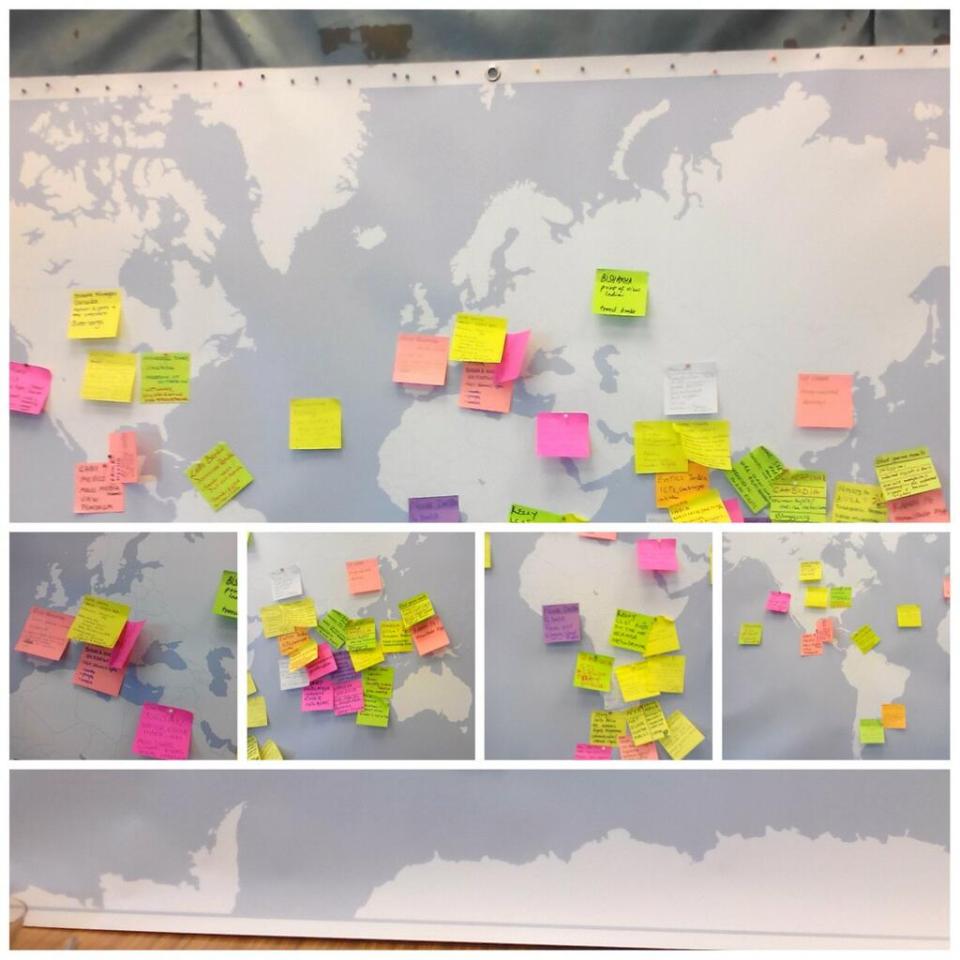
What would have once seemed like a mere dream – namely women around the world having instant access to a tool, which enables them to challenge the status quo, connect to one another and to change each other’s lives – is now a reality thanks to the internet. Although new technology has always changed the way that we communicate and as a result the way that we think and act, what makes the internet particularly revolutionary is firstly, that it contains all the other forms of communication. Where traditional media – print, radio, TV etc. – requires not only large sums of money but also expertise on digital equipment, sound regulation, paper stock and so on, a single website on the internet can instantly pull together the written word, audio sounds and visual as well as moving imagery. The second reason that the internet is more ground breaking for the feminist movement than other technological revolutions is its wide availability. It is possible to bypass traditional gatekeepers, restraints of formal training and inaccessible funding resources because free templates and social sharing platforms are within reach to anyone who can read, write and has access to the internet.
These advantages have resulted in significant gains for feminists: Indeed, it has been argued by, among others, The New York Times, The Guardian and Marketing Magazine, that we have entered the fourth wave of feminism – The Digital Wave. This is a wave that has unequivocally elevated the discourse surrounding social justice not only in online feminist spaces but also in the mainstream. In fact, thanks to the explosion of feminist organizing online (online petitions, social media campaigns, blogs, podcasts, e-zines etc.) that have sprung up in the last decade or so, the women’s movement has transformed the ways in which politicians, thought leaders, commentators, entrepreneurs, grassroots activists and the general public in many parts of the world discuss the most critical issues of the day. If ever there was a time when women’s rights was in “mode” then this is it.
Yet while the digital wave is marked by more diversity than previous feminist waves, with people of all walks of life contributing, it is nevertheless predominantly the ways that white/western feminists challenge patriarchal structures using the internet that has garnered attention. Fourth-digital wave feminists campaigns such as Everyday Sexism, #FemFuture and Fem 2.0 have been highlighted in the global mainstream. However, important milestones of the global feminist struggle go ignored if we look only at the ways that the white/western feminist movement uses the internet. The fact is that feminists everywhere are using new technologies to fundamentally change society but the achievements of online feminisms in Africa, for instance, are hardly known within the continent, let alone outside it. NGOs and international bodies have addressed the use of ICTs in Africa – not a bad thing per se – but as a result, without mainstream discussion, digital feminism in Africa is mostly discussed in terms of development. Or, the discussion has, in Eurocentric fashion, all too often implied that African women using technology to advance feminist causes is a result of westerners “helping” local women.
This could not be less true. African women, a group especially marginalised from mainstream media, have made wide use of the advantages that the internet enables. African women have used new technologies to tackle sexism and repressive traditions; they have used blogs and forums to document their stories and to connect with each other; and they have used the tools of the internet and technology to campaign, raise petitions, create apps and e-zines and to empower one another to demand change. It is worth noting at this stage, however, that while the internet provides important tools for feminist activism, like elsewhere, African women also face challenges such as cybercrimes against women, stalking, sexual harassment, digital manipulation of photographic images, abusive messages and threats, humiliating comments, professional sabotage and sharing of intimate photos and videos used to blackmail women in violent relationships. Nevertheless the opportunities of digital technology far outweigh the risks and women must continue to use online tools for communications while taking appropriate measures to protect themselves.
A few examples will show how African feminists are using the internet to change society. Starting with a quote from Amai¨cool Mpombo, a member of the Women Lawyers Association of Congo, who confirmed the usefulness of the internet in the 2013 Global Information Society Watch report on women’s rights, gender and ICTs. She said:
“Before the internet, people had to head to libraries. Law books are expensive, so most people didn’t have them readily accessible. But even then, women in the professional world didn’t have much time to go to the library. Now, when I’m in my office, I can easily access the internet and find the information that I need on the subjects that interest me. The internet is of fundamental importance and helps us greatly in our work, most notably in improving our research so that we can better help the people who contact us.”
Mpombo is speaking particularly to the advantages ICTs play in her field, but make no mistake; they are equally beneficial to women across different sectors.
Take for instance, the blog Adventures from the Bedrooms of African Women, which started in January 2009 as a space for African women to share experiences about sexuality. The blog, which is managed primarily by Ghanaian feminist Nana Darkoa Sekyiamah, provides a safe space where African women can openly discuss a variety of sex and sexuality related issues with the intention of learning from each other, having pleasurable and safer sex as well as encouraging continuous sex education for adults.
On the opposite end of the spectrum of political campaigning, consider the story of Yasmina Oue´gnin, a female MP in Cote d’Ivoire who secured a seat in parliament through online mobilisation. By using Facebook and Twitter efficiently, which is to say by sharing her daily schedule, uploading pictures, answering questions and informing citizens on issues of importance to them, Oue´gnin managed to charm and engage people and as a result become one of the youngest members of parliament in the country’s history, as well as a champion for online citizen engagement in democratic processes.
Another example is that of the Nigerian online feminist, Dupe Killa, who is attributed with starting the #ChildNotBride hashtag awareness campaign in response to a law that permitted a senator, Ahmed Sani Yarima, to marry a thirteen year old girl. While the hashtag and accompanying petition did not expunge the law, the petition was oversubscribed and the country’s leading newspapers all carried the story.
Resistance has not always been campaign specific, as the blog Black Looks shows. As a space by and for “African Queers and Allies”, Black Looks has been using the digital space for over a decade to archive, disseminate and advocate for LGBTQI African’s rights. The site, which was founded by Nigerian feminist Sokari Ekine, covers a wide range of topics from cultural and traditional discussion to testimonies to issues such as women’s rights in the Niger Delta.
In Ethiopia, Nahu Senay Girma and Roman Kifle set up the Association of Women in Business (AWiB), which is another example of a platform that has enabled women to come together using the internet. The online forum facilitates discussions on various topics and supports the skills development of its members by providing an e-learning platform to encourage more women entrepreneurship in the male dominant country.
Similarly in Rwanda, women entrepreneurs have formed a group called Girls in ICT Rwanda, which as the name implies encourages women and girls to venture into ICTs by visiting schools and speaking to girls about technology. The initiative has since awarded outstanding women and girls such as Akaliza Keza Gara, the managing director of Shaking Sun, a multimedia company; Paula Saphir Helene, the senior network security engineer at RDB; Immaculate Bugingo, the chief executive officer of Rwanda Gateway Limited; and Marie-Christine Gasingirwa, the director general of science and technology at the Ministry of Education. They were all recognised for creating new digital opportunities.
Last month, Brainstorm Kenya, an online journal published an e-book on women and feminisms in Kenya, publicising it using the title (and hashtag) #WhenWomenSpeak – (Re)Defining Kenyan Feminisms. On their site they said, “This e-book hopes to change that [oppression] by creating a basis for further conversation on feminism in Kenya/by Kenyans, as well as a space for discussion that is not reliant on the West. It will also help people understand that feminism is for everyone.”
Many people are now aware of the role that Egyptian women played during the Arab Spring and the ongoing changes in the country. What is remarkable about Egyptian women’s impact is how they used internet tools, especially blogs, social networks and Twitter, to express their opinions, call for national and international alerts to sexual attacks and harassment, call for rallies and boycotts, voice their opposing points of view, and to uncover and warn other women about attacks and dangerous zones. In fact, current Egyptian women’s activism is near synonymous with the use of online technologies.
These are stories – by no means exhaustive – about women using the internet to change African society. Their campaigns have not simply remained online but they have resulted in change in people’s homes, their streets and in public life. Further, they have lessons for women the world over. In 2013, I wrote an article in The Guardian’s Comment is Free (CiF) pages: African women blazing a feminist trail – why don’t we hear their voices? In the article, I argued that some of the gains that African feminists have made, which would once have sounded like far-fetched feminist fantasies (such as women forming 64% of parliament in Rwanda) are met with a loud silence from the feminist movement at large. The article not only did extremely well on social media networks such as Facebook and Twitter but it was also picked up by Sheryl Sandberg’s (Facebook CEO and author of “Lean In”) blog where it went viral. It has to date, (17 April, 2014) 33, 485 notes: the highest amount of feedback on any of the Lean In blog posts. This demonstrates the breadth of the audience (assuming Lean In blog readers are primarily white, well to do women) who are interested in inclusive discourses and would like to understand feminist developments taking place in Africa. In an increasingly inter-connected world, where oppressions intertwine, we should make sure that our struggles – and victories – also knit together.
- 19549 views






Add new comment